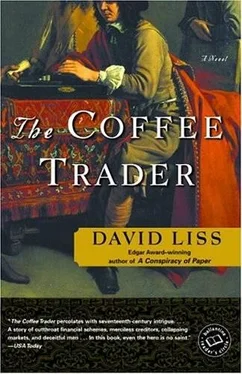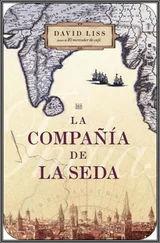“I can pay you a thousand,” Miguel suggested. “No small sum, and certainly an indication of our seriousness.”
Nunes’s hand had remained on Miguel’s shoulder, but it now pressed so hard he pushed Miguel up against the tavern wall. “Have you lost your wits?” he asked in a husky whisper. “There is no maneuvering with the Company. If I say I need fifteen hundred, I need that sum, not some token. I’ve contracted with them, you’ve contracted with me, and the deal is to be done. If you don’t give me that money, I will have to pay it out of my own account. You’re my friend, Miguel, but you have put me in a terrible position.”
“I know, I know.” Miguel held his hands up like a supplicant. “It’s these partners of mine-good for the money but slow with payment. But I’ll have the funds-by the end of next week, as you say.” Miguel would have told him anything to end the talk of contracts. “Perhaps,” he suggested as he turned away, “you could say a word or two to Ricardo on my behalf.”
“I’ll not fight your battle for you,” Nunes called after him, “nor get between you and Parido.”
He’d had enough disquiet for one day, but when he walked into his brother’s house, he knew at once that something terrible had happened. Daniel sat in the front room with a strange look on his face, disappointment and satisfaction all at once.
“What is it?” Miguel asked him. “Have you been searching-” He stopped. It was a line of inquiry that could lead to no good.
Daniel stretched out his arm to present a sealed letter. A sealed letter. How many times would Daniel confront him about his correspondence? But even as he thought the words, Miguel knew this letter was different-and Daniel already knew its contents.
Miguel numbly broke the seal and opened the triply folded paper. He did not have to read the ornate handwriting or the carefully chosen words in formal Spanish. He knew what it said. Miguel had been summoned to appear the next morning before the Ma’amad.
There were only a few hours of daylight remaining, and Miguel wished to use them to his advantage. He could feel the hot breath of ruin upon the back of his neck, but he might still arm himself against the battle and prevail. For all his grievances with the Ma’amad-and he had many-he believed it did possess one quirk that might work in his favor. The council did not condemn on mere principle. Parido might speak against him, might try to persuade the council to act, but the parnassim would listen to reason. They wanted the community to thrive so they were inclined to accept apologies and consider particular circumstances. Many a man had pulled his fat out of the Ma’amad’s fire by having a careful argument at the ready.
To prepare such an argument, Miguel would have to learn precisely why the Ma’amad wished to see him, though he felt almost certain he knew. Surely Joachim had spoken ill of him to the council. Now he needed to know what he had said and what kinds of charges were to be brought against him, and that presented a terrible irony. He had wanted nothing so much as to avoid that madman, but now he must seek him out.
Before Miguel had even begun to formulate a plan whereby he might find Joachim, he recalled something else, something Hendrick had said before he had been attacked in the tavern. You can tell us a story of your amorous victories or the strangeness of your race or some incomprehensible plan to conquer the Exchange. Geertruid had sworn to keep their business a secret from her dog, so why was he barking on about it? And what was the true source of her money? Could she and her loose lips be the source of this summons?
Without taking a moment to explain himself to Daniel, Miguel rushed out of the house and returned to the Singing Carp, muttering hopeful half prayers that Geertruid would still be there. She was not. Miguel asked the tap man, who let it be known he might very well have heard something of her destination, and a coin might help his memory; for two stuivers, the fellow recalled that she attended a banquet at the far end of the Bloemstraat.
Miguel found the entrance to the banquet hall in the upper portion of an unpretentious red-brick house. He climbed the stairs and pounded; when a servant boy answered the door, Miguel only said he had come for the feast and the boy ushered him up the stairs to a wide room with six or seven dark wood tables spread out on a series of mismatched Eastern rugs. Sconces with good smokeless candles reached out of the doorposts and along the walls, and great chandeliers descended from the ceiling. Dozens of paintings had been hung without regard to spacing or ease of viewing. Two large fireplaces on the far sides of the room blasted out oppressive heat, and in the corner a pair of fiddlers played madly to make their music audible above the din of drunken chatter.
On the tables, at each of which sat ten or twelve banqueters, were piles and pots of food: oysters, boiled fowl, a steaming vessel of hutsepot with the leg of some unclean animal thrust outward like the desperate grasp of a drowning man. There were enormous wheels of cheese and plates of herring, pickled, baked, and stewed. There were bowls of hot milk with melted butter floating at the top; also white breads, figs and dates, roast parsnips, and Dutch sla, made of chopped raw cabbage and carrot. While Miguel struggled to preserve himself, Geertruid feasted.
Buxom girls moved from table to table, pouring drink into cunning goblets with no stems. Miguel had seen, and fallen victim to, these vessels himself; they could not be set down, and so they encouraged drinking far beyond one’s limit. This merry crowd consisted mostly of men, but there was a woman or two at each table, as red and drunk and merry as the assortment of black-clad tall-hatted gentlemen diners, who managed to drink, smoke, and eat all at once.
At the table nearest the entrance, a man with one eye and one arm took notice of Miguel. In his remaining hand, his left, he clutched his goblet tight, unable to let go, even to dine. “Ho, there,” he shouted above the din. “Who called for a Jew?”
Miguel had not noticed Geertruid until that moment. Even from a distance, the length of two or three men, he could see the gracelessness of her movements and the unfocused wonders of her eyes. With one hand, she pushed herself from her chair and walked unsteadily to meet him by the door.
“Sober yourself,” Miguel snapped. “I must have words with you. What is this, anyhow? With whom do you feast?”
“It is the Brewers’ Guild,” she said.
“What business have you with these men?” he demanded.
“Oh, Miguel, I may have friends and acquaintances outside your approval, you know. Now tell me what has happened.” Her eyes went as wide as a child’s.
“It is the Ma’amad. It has summoned me to appear before it tomorrow morning.”
She let out a loud laugh that pierced through the clamor of drunken revelry. “You and your Mohammed. Are you a Jew or a Turk?”
He took a deep breath. “Geertruid, I must have some answers.” He hardly ever called her by her given name. He recalled that he had done so the night he had tried to kiss her, and the memory still left him mortified. “Have you spoken of our business to anyone?”
“Of course not.” She shook her head rapidly, and then reached up with one exploratory hand to make sure her prim little cap, beaded with rubies, had not been knocked out of place.
“Ho, Jew,” one of the men from her table called. “Send us back our merry friend.”
Geertruid waved them off: a quick, gawky gesture with the back of her hand.
“You haven’t told Hendrick?”
“Hendrick,” she repeated. “That ox. I would not trouble him with the secret of making rocks sink in a canal.”
Читать дальше












